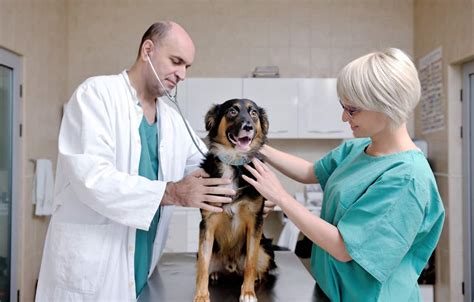As a veterinary assistant, you play a vital role in the healthcare team, supporting veterinarians and veterinary technicians in providing top-notch care to animals. To excel in this profession, you'll need to possess a unique combination of technical, communication, and emotional skills. Here, we'll explore the 8 essential skills required for veterinary assisting success.

Compassion and Empathy
As a veterinary assistant, you'll work with animals that are injured, ill, or in distress. Developing compassion and empathy is crucial to provide emotional support to both the animals and their owners. You'll need to be able to understand and respond to the emotional needs of your patients, often in high-stress situations.
Communication Skills
Effective communication is vital in any healthcare profession, and veterinary assisting is no exception. You'll need to communicate clearly and concisely with veterinarians, veterinary technicians, and pet owners to ensure that animals receive proper care. This includes listening actively, asking questions, and providing instructions.
Technical Skills
As a veterinary assistant, you'll be responsible for performing various technical tasks, such as:
- Taking vital signs (temperature, pulse, and respiration rate)
- Collecting and processing laboratory samples
- Preparing animals for exams and procedures
- Assisting with medical procedures
- Administering medications
You'll need to develop strong technical skills to perform these tasks accurately and efficiently.
Time Management and Organization
Veterinary clinics can be fast-paced and chaotic, with multiple patients and procedures occurring simultaneously. To succeed as a veterinary assistant, you'll need to be able to prioritize tasks, manage your time effectively, and maintain a clean and organized workspace.
Attention to Detail
As a veterinary assistant, you'll be responsible for recording medical information, monitoring patient progress, and preparing medications. Attention to detail is critical to ensure that animals receive accurate diagnoses and treatment.
Teamwork and Collaboration
Veterinary assisting is a team-based profession. You'll work closely with veterinarians, veterinary technicians, and other support staff to provide comprehensive care to animals. Developing strong teamwork and collaboration skills is essential to ensure that patients receive seamless care.
Adaptability and Flexibility
Every animal is unique, and every situation is different. As a veterinary assistant, you'll need to be adaptable and flexible to respond to changing circumstances, such as unexpected medical emergencies or last-minute schedule changes.
Continuing Education and Professional Development
The veterinary field is constantly evolving, with new technologies, treatments, and procedures emerging regularly. To remain competent and up-to-date, you'll need to commit to ongoing education and professional development, such as attending workshops, conferences, and online courses.
Developing the Essential Skills for Veterinary Assisting Success
While some of these skills may come naturally, others can be developed through education, training, and practice. Here are some tips to help you develop the essential skills for veterinary assisting success:
- Pursue formal education or training in veterinary assisting
- Gain hands-on experience through internships or volunteer work
- Develop strong communication and interpersonal skills through practice and feedback
- Stay current with industry developments through continuing education and professional development
- Seek mentorship and guidance from experienced veterinary assistants or veterinarians

By developing these 8 essential skills, you'll be well on your way to a successful and rewarding career as a veterinary assistant. Remember to stay focused, committed, and compassionate, and always be willing to learn and grow.
Real-Life Scenarios: Applying the Essential Skills
Let's take a look at some real-life scenarios that illustrate the application of the essential skills for veterinary assisting success:
- A pet owner is anxious about their dog's upcoming surgery. As a veterinary assistant, you take the time to listen to their concerns, provide reassurance, and explain the procedure in a clear and concise manner.
- A veterinarian requests that you collect a blood sample from a cat. You carefully prepare the equipment, follow proper protocol, and handle the cat gently to minimize stress.
- A medical emergency arises, and you need to quickly respond to provide care to an animal in distress. You remain calm, prioritize tasks, and work efficiently with the veterinary team to provide timely and effective care.

These scenarios demonstrate the importance of developing strong technical, communication, and emotional skills as a veterinary assistant.
Conclusion: Unlocking Your Potential as a Veterinary Assistant
As a veterinary assistant, you have the power to make a real difference in the lives of animals and their owners. By developing the 8 essential skills outlined in this article, you'll be well on your way to a successful and rewarding career. Remember to stay focused, committed, and compassionate, and always be willing to learn and grow.
We'd love to hear from you! Share your thoughts, experiences, and tips for veterinary assisting success in the comments below.






What are the most important skills for a veterinary assistant to possess?
+The most important skills for a veterinary assistant to possess include compassion, communication, technical skills, attention to detail, teamwork, adaptability, and continuing education.
How can I develop my technical skills as a veterinary assistant?
+You can develop your technical skills as a veterinary assistant by pursuing formal education or training, gaining hands-on experience through internships or volunteer work, and staying current with industry developments through continuing education and professional development.
What is the most challenging part of being a veterinary assistant?
+The most challenging part of being a veterinary assistant can vary depending on the individual, but common challenges include managing high-stress situations, communicating effectively with pet owners, and maintaining a high level of technical competence.
